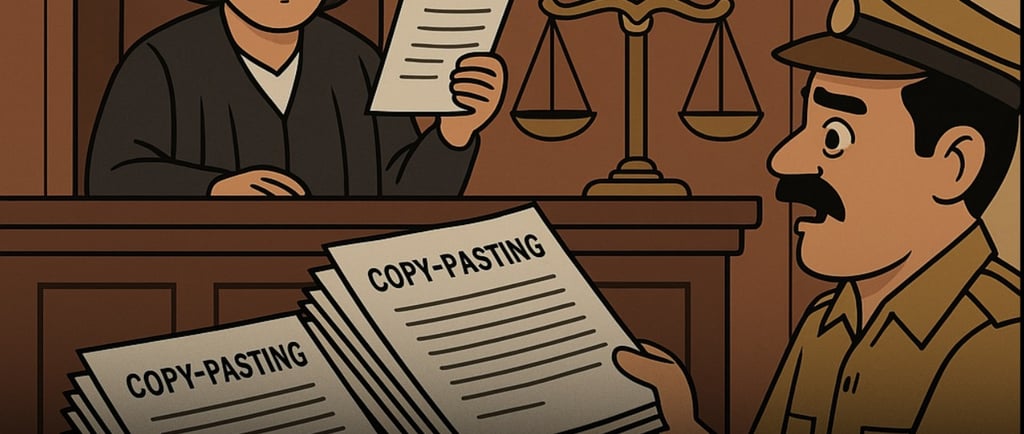Bombay High Court takes up case on its own over police 'copy-pasting' witness statements.
The Bombay High Court at Aurangabad recently took suo motu cognizance of a growing issue where police officers are "copy-pasting" witness statements during criminal investigations. A bench of Justices Vibha Kankanwadi and Sanjay Deshmukh flagged this practice as dangerous, noting that it could unfairly benefit the accused and undermine the seriousness of genuine cases.
5/6/20253 min read


The Bombay High Court at Aurangabad has taken suo motu cognizance of a concerning trend where police officers appear to be copy-pasting witness statements in criminal investigations. This development came in the case of Amol Samadhan Nikam and Ors v State of Maharashtra, where the Court, comprising Justice Vibha Kankanwadi and Justice Sanjay Deshmukh, raised serious concerns over the authenticity and integrity of police investigations.
The Court's observations stemmed from its scrutiny of a charge sheet filed in a case involving the alleged abetment of suicide of a minor girl. During the examination, the bench noted that several witness statements were identical in wording, with entire paragraphs being repeated verbatim across different statements. This led the Court to conclude that these statements had been "literally made copy-paste," raising doubts about whether the witnesses were actually questioned at all.
Such practices, the Court warned, could significantly weaken the prosecution’s case and might offer undue advantage to the accused. It emphasized that in a functioning criminal justice system, no two witnesses are expected to speak in identical terms, particularly when giving separate accounts of events. The only observable variation among the statements was the relationship of each witness to the deceased or complainant, while the rest of the content remained strikingly similar.
The judges also cast doubt on whether police even summoned the witnesses for questioning, expressing concern that fabricated or template-like statements were being submitted as genuine accounts. They highlighted this as a possible violation of Section 161 of the Code of Criminal Procedure (CrPC), which pertains to the recording of witness testimonies by police officers during an investigation.
Although the issue had been previously noted in cases under Section 498A of the Indian Penal Code (IPC), which deals with cruelty by a husband or his relatives, the bench observed that this disturbing trend is now appearing in graver cases, including Section 306 IPC (abetment of suicide). Given the seriousness of the matter, the Court decided it was time to intervene.
The Court stated that such repetition of witness statements indicates a systemic problem within police investigation methods. It called the practice dangerous because it undermines the gravity of genuine cases and potentially erodes public trust in the justice system. If the police rely on such mechanical methods even in serious criminal matters, it reflects poorly on the overall health of the investigative and judicial process.
To address this growing concern, the Court appointed Advocate Mukul Kulkarni as an amicus curiae—a legal advisor to the Court—to examine the issue further. He has been tasked with collecting data, analyzing the extent of the problem, and recommending measures that the State could adopt to enhance the quality of criminal investigations. The Court directed him to submit his findings and suggestions by June 20, with the matter scheduled for further hearing on June 27.
The observations were made during the hearing of a petition by five members of a family from Jalgaon district, who had requested the quashing of criminal charges against them in connection with the suicide of a 17-year-old girl. Initially treated as an accidental death, the case evolved after further inquiry revealed that the deceased was a minor. As a result, police added charges under more stringent provisions, including the abetment of a minor’s suicide.
Though the accused eventually withdrew their plea to have the case quashed, the High Court decided to take up the larger issue of police procedural lapses. The judges stated that the presence of template-like witness statements in such a serious case was deeply troubling and indicative of larger flaws in investigative processes.
The bench stressed the need for reform and proper oversight. It reiterated that uniform statements defeat the very purpose of recording individual witness testimonies, which should reflect unique perspectives and observations. The justices added that this is not an isolated incident, and similar patterns have emerged in multiple cases, suggesting widespread misuse or neglect by investigating officers.
The Court ultimately called on the State of Maharashtra to take the matter seriously and formulate clear guidelines for police officers regarding the proper procedure for recording witness statements. It expressed a desire for structural improvements in how investigations are carried out, including safeguards to ensure the genuineness and reliability of evidence being collected.
In conclusion, the Aurangabad Bench of the Bombay High Court has issued a strong warning against the mechanization of criminal investigations and has urged both the judiciary and the executive to recognize and rectify the systemic issues at hand. The suo motu initiative marks a proactive step towards strengthening the credibility of criminal trials and ensuring that justice is delivered on the basis of authentic and independently verified evidence, rather than convenience or negligence.
